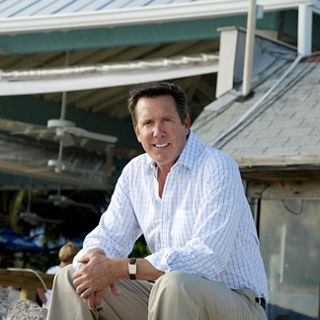Shellfish Growers Climate Coalition
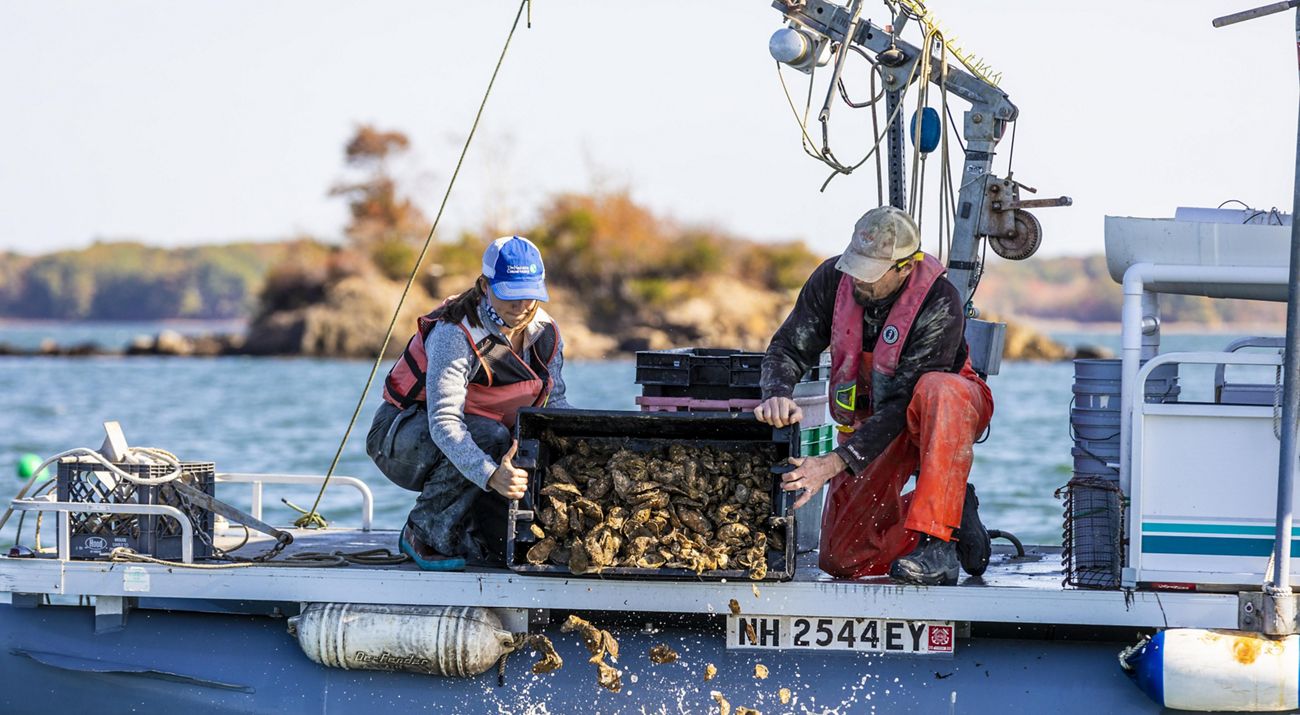
- Email: sgcc@tnc.org
-
Follow
Our members are working to secure a low-carbon future for the shellfish we all love to eat and the waters that sustain them—before it’s too late.
- Switch to:
- Home
- About Us
- Our Members
- Take Action
- Our Stories
- Join Us
To grow healthy shellfish, farmers need clean water, robust ecosystems, and a stable climate. This drives many in the industry to prioritize environmental conservation and climate mitigation, both on and off the water.
In 2018, a group of seven U.S. shellfish growers formed a partnership with The Nature Conservancy to create the Shellfish Growers Climate Coalition. Today, we represent more than 250 shellfish businesses from 25 U.S. states and Canada working to advocate for sound climate policy by highlighting how climate change has impacted our lives and livelihoods. In addition to advocacy within the coalition, our members are going the extra mile for the environment in their day-to-day work.
Shellfish Businesses Striving for a Sustainable Future
From growers, harvesters and hatchery operators to wholesalers, retailers, restauranteurs and gear manufacturers, SGCC members are cultivating a better future for our oceans and the planet.

Driving Innovation with Joth Davis
“My kids need a sustainable planet,” said Joth Davis, who started growing oysters in Washington more than 30 years ago when he founded Baywater Shellfish Company. “It’s above and beyond the business piece—we have to have a consciousness about our footprint on the planet.” After handing over the reins to his son, Caleb, Joth launched Blue Dot Sea Farm in Hood Canal, where he grows shellfish and seaweed together.
His interest in sustainability is part of what drew Davis to oyster farming to begin with. Farmed bivalves are one of our lowest impact sources of protein, requiring no land, feed, or freshwater to grow, and emitting negligible amounts of greenhouse gases. As filter feeders, oysters and other bivalves also improve water quality by removing excess nitrogen and phosphorus that could otherwise contribute to algal blooms. These effects are top of mind for Davis, whose team keeps careful measurements of a wide range of metrics. “We keep track of how many oysters we’re removing at harvest, tabulating nutrient removal and carbon sequestration to get a sense of the impact on the canal and Washington state.”
This data-minded approach supports Davis’s other venture, Pacific Hybreed. At their hatcheries in Hawaii and Washington, the company is breeding shellfish to be resilient to ocean acidification, warming waters, shifting salinity, and other climate-related challenges. He hopes that this work will allow farms like his to prosper for decades to come. “We really need to be more proactive in terms of being able to grow shellfish into the future with the threats coming down the pike,” Davis noted.

Tackling Plastic with Ocean Farm Supply
Oyster farming has a much lighter footprint than most other forms of protein production, but much of the gear available to growers is made from plastic, which is problematic on several levels. For one, the majority of plastic is derived from petroleum and natural gas, in a process that releases greenhouse gases. By some estimates, plastic production accounts for around 4.5 percent of global greenhouse gas emissions. But the consequences don’t end there; marine species can mistake plastic debris for food, or get entangled in discarded fishing nets. Additionally, plastics don’t decompose like organic materials; instead, they break into tiny pieces, known as microplastics, that can take thousands of years to degrade. These microplastics enter our food and water supply and pollute ecosystems, with as yet unknown effects on animal and human health.
When Eric Oransky, Maine Ocean Farms co-founder and director of sales, got into the shellfish farming business, he and his team were perturbed by the prevalence of plastic, particularly the mesh bags used to transport oysters from the farm to customers, since they can only be used once and are typically disposed of within a few hours of delivery. They recognized that replacing these single-use bags would be the most straightforward and immediate way to reduce plastic use on the farm, but when seeking out alternatives, they came up short.
Undeterred, Maine Ocean Farms decided to develop their own biodegradable bags. After searching and sampling, they found a company manufacturing fruit and vegetable bags using a fiber made from sustainably harvested beechwood trees. Using that same fiber, they worked together to design a new bag with a heavier weave that’s more suitable for carrying shellfish. Though the product was initially intended just for the farm’s own use, pandemic-related business disruptions gave them the opportunity to make it available to a broader audience, leading to the creation of Ocean Farm Supply.
Erin Adams, a scientist with a background in marine plastic waste, helped co-found Ocean Farm Supply and now serves as its CEO. “Growers and consumers want different options for packaging, but you can’t buy something that isn’t readily available to you,” said Adams. “If you want an alternative that isn’t there, then you’re going to be stuck with the plastic. So we’re hoping that this product opens up different conversations and can help shift the consumption away from landfills.”
Like Oransky, Adams interest in this work stems from a deeper commitment to community. “From working on the boats together, we have a similar work ethic of leaving a place a little bit better than you found it. If we don’t try to find solutions for plastic waste, then that’s just leaving the problem for other people to figure out.”

Recycling Shells with Kimball House
Since Kimball House opened nearly a decade ago in Decatur, Georgia, the restaurant has been known for its oyster program. That’s no coincidence; co-founder and shellfish manager Bryan Rackley has built a close relationship with the farmers from whom he sources his inventory, a process that has introduced him to other aspects of the shellfish industry. “I took the responsibility of doing the research of where oysters were coming from and stumbled upon the path of how good they are, not just for humans but for other organisms.”
In fact, he came to appreciate oyster farming so much that he decided to get into the field himself. “I was like, I have to do this!” With the support and guidance of fellow farmers, Rackley is in his second year of growing oysters in Spring Creek, Florida. “It’s a pretty rewarding feeling to be able to put in some work that is beneficial, albeit back breaking,” Rackley said. “I can’t tell my six-year-old that we singlehandedly saved the world, but I can at least say that we’ve done something.”
On a regular night, Kimball House serves hundreds of oysters, adding up to several million over the course of the last nine and half years. All those oysters mean shells—lots and lots of shells. At first, Rackley wasn’t sure what to do with the leftover shells, but he held onto them anyways. “I couldn’t stomach throwing away shells, so we just started piling them up.” Eventually, the Georgia Department of Natural Resources (DNR) reached out to ask if they could collect the shells for wild oyster reef restoration. Rackley agreed, and DNR showed up with a dump truck soon thereafter to haul the huge heap of shells away.
Oyster reefs were once abundant in the United States’ coastal waters, providing food and habitat for other marine species and protecting shorelines from erosion. But as a result of overharvesting, disease, pollution, and climate change, 85% of the world’s oyster reefs have disappeared, making it one of our most imperiled marine habitats.
In the process of rebuilding these critical ecosystems, the first step is laying down substrate for oyster larvae to attach themselves to, where they’ll grow a shell and spend the rest of their lives. While other materials can be used, oyster shells are the best substrate available—and each recycled shell can support up to 20 new oysters. So every time a Kimball House diner enjoys an oyster, they can also feel good about the fact that they’re indirectly helping restore oyster reef habitat.

Educating Consumers with Julie Qiu
Culinary appreciation and a love of travel inspired Julie Qiu, the oyster expert and educator behind the In a Half Shell blog, to start documenting her experiences with oysters around the world. But as she learned more about the challenges facing farmed and wild oysters, and the environmental benefits they can offer, she started incorporating an element of sustainability into her work. “Knowing the history of the rise and fall of oysters in the U.S. gave me the sense that something should be done so we can have oysters in the future,” Qiu said.
While Qiu still highlights growers and oyster bars and shares educational resources on her website, she has branched out into other outlets to make oyster more accessible to diners. She has developed oyster appreciation products like an oyster tasting journal and created a nine-part oyster master class for Skillshare. During the pandemic, when consumers couldn’t eat oysters at their local restaurants, Qiu started offering Zoom shucking classes. “Teaching a consumer how to shuck is such a game changer,” she noted. “It was really cool to see people realizing, ‘It’s not that hard and I can totally do this.’”
Improving consumer comfort with oysters could help facilitate a shift towards more climate-friendly diets. One study found that if Americans replaced 10% of their beef intake with oysters, we could achieve greenhouse gas emissions reductions equivalent to taking 10.8 million cars off the road. Such a dramatic change is unlikely to happen immediately, but the kind of outreach Qiu is doing is an important first step. “Education is really critical in getting people to eat more oysters and talking about them for a sustainability standpoint. Overnight, an oyster newbie can become an oyster ambassador.”
Featured Stories
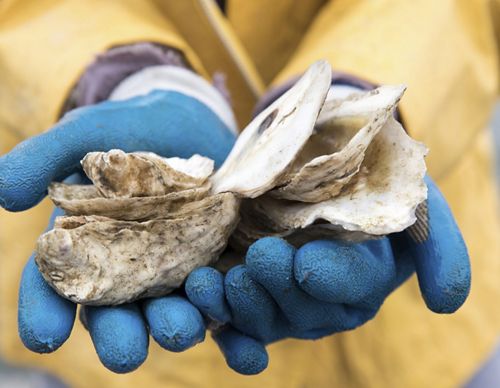
Heard on the Half Shell
Anywhere there’s a coastline, you can find climate impacts—now it’s time to inspire action by letting policymakers know how those impacts have touched the lives of shellfish farmers, coastal residents and the shellfish-loving public.
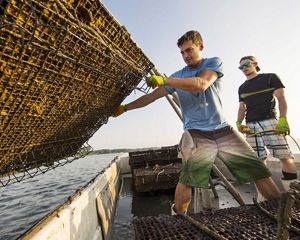
Uniting Shellfish Growers Around Climate: A Conversation with Sally McGee
Learn how the Shellfish Growers Climate Coalition is lifting up growers' personal stories about the impacts of climate change.
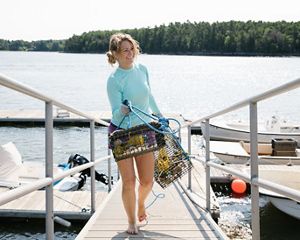
The Inflation Reduction Act is a Victory for Coastal Businesses and Communities
Historic Investment in Climate Solutions to Reduce Emissions by 40%
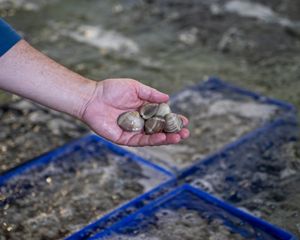
Oyster Hatcheries Help the Industry Adapt to Climate Change
How can the shellfish industry adapt to the challenges posed by climate change?
Contact the Coalition
Questions about the coalition or its work? Contact Sally McGee at smcgee@tnc.org.
About the Coalition
Anywhere there’s a shoreline, you can find signs of the impacts of climate change—sea level rise, ocean acidification, increased frequency and severity of storms. You’ll also find shellfish growers, many of whom have been making their living farming from the sea for generations and whose businesses form the backbone of their small-town coastal communities.
Enter: the Shellfish Growers Climate Coalition—a passionate group of shellfish farmers, harvesters, hatchery operators, wholesalers, retailers and restauranteurs from every U.S. coast and Canada. Members are committed to bringing about climate action by sharing personal stories about how climate change has impacted their lives and livelihoods. The coalition’s goal is to advocate for sound climate policy and secure a low-carbon future to benefit the shellfish we love and the waters that sustain them—before it’s too late.
Coalition FAQ
General
-
Our coalition was established in 2018 when a group of seven U.S. shellfish farmers partnered with The Nature Conservancy to help move the needle on climate change. We are an “endorsement” coalition, with all members supporting the goal of reduced carbon emissions. The SGCC is open to representatives from all food sectors who wish to engage with consumers and policymakers to help chart America’s course towards a low carbon future.
-
- Fishers Island Oyster Farm, NY (Sarah and Steve Malinowski)
- Hama Hama Company, WA (Lissa James Monberg)
- Hog Island Oyster Company, CA (John Finger and Terry Sawyer)
- Island Creek Oyster Company, MA (Chris Sherman)
- Rappahannock Oyster Company, VA (Ryan Croxton)
- Taylor Shellfish Farms, WA (Bill Dewey)
- Mook Sea Farm, ME (Bill Mook)
-
Shellfish growers are seeing a range of impacts on their businesses and their bottom lines. Some are experiencing the impact of ocean acidification, which is influenced by increased carbon dioxide in the atmosphere, on larval oysters that are unable to grow shell properly. Others are seeing the effects of sea level rise on their coastal businesses. Increasing frequency and intensity of storms can impact shellfish growers’ facilities and their ability to reliably get products to market. And, increasing water temperatures can lead to higher levels of bacteria such as Vibrio parahaemolyticus, which negatively impact shellfish farms by adding costs to ensure shellfish safety. Now, more than ever, the ocean waters our members depend on are in peril.
-
Climate change is nowhere more evident than along U.S. coastlines, where coastal communities and small business have borne the brunt of its destruction and devastation. While people understand the value of shellfish growers for farming and harvesting the seafood we all love to eat, the industry provides so much more than what’s on the raw bar. In many cases, our members have been farming from the sea for generations, and their businesses form the economic backbone of their small-town coastal communities. Moreover, shellfish is one of the most environmentally friendly and sustainable sources of protein, and certain species, such as oysters, can actually benefit the marine environment by filtering water, reducing shoreline erosion, and promoting marine biodiversity. The stakes are high, and by lifting up our voices as members of the shellfish industry, we can create the momentum needed for other people and other industries to do the same.
Joining the Coalition
-
All members agree on certain fundamental issues relating to climate change. Specifically:
- Human impact on the Earth’s climate system is well documented, scientifically understood and profound.
- Taking action to address climate change is imperative to secure the viability of our businesses, our communities and the natural resources they depend upon.
- Improving people’s understanding of climate change and its impact on our businesses represent an important way to secure public support for clean energy policies.
- Enacting policies that reduce carbon emissions and encourage low-carbon choices are crucial to a low carbon future.
Prospective members are asked to sign a conflict of interest form (to ensure no conflicts exist between the business and The Nature Conservancy). They are also asked to sign a Corporate Agreement among all Coalition members. That’s all that’s necessary to join!
-
The level of engagement is up to each individual member—some members are happy to simply have their company’s name listed as a member our put our logo on their website, while others join our Executive Committee or gather on Capitol Hill during Lobby Days. Many of our activities relate to The Nature Conservancy’s climate strategies, which form the foundation of the Coalition’s policy activities.
-
If you’re a shellfish business and care about acting on climate, join the Shellfish Growers Climate Coalition today by filling out this form.
Impact
-
More and more members of the shellfish industry are reaching out to us to join the coalition every day, so there is growing strength in numbers. Member businesses engage with thousands of consumers; our expanding coalition has significant reach in terms of consumers and policymakers. Leveraged with The Nature Conservancy’s sound science and climate strategy, we expect the coalition will exercise significant influence at the state and federal level in terms of climate policy. By sharing out our unique, firsthand experiences with climate impacts with legislators and decisionmakers, we hope to turn the tide on climate action—before it’s too late.
-
Coalition members have close business relationships with seafood wholesalers, restaurants and others that rely on a dependable source of shellfish, many of whom have become members. Additionally, members recognize that other food sectors are feeling the impacts of climate change, as well. Whether that be farmers in the Midwest, winemakers in Virginia or supermarket chains across the country, the coalition looks forward to partnering with other food sectors to address climate change.
Join Our Coalition
If you’re a shellfish industry business and care about acting on climate, join today.
I’m InOur Members
The Shellfish Growers Climate Coalition represents more than 250 members from all U.S. coasts and Canada—and steadily growing. Click below to discover the shellfish farmers, wholesalers, restaurateurs and vendors who are standing up for swift action on climate.
Coalition Membership by Region
-
Alaska
Alaska Shellfish Farms
Alutiiq Pride Shellfish Hatchery
Aquabionics
Blue Starr Oyster Co
Jakalof Oysters
Kaawu Shellfish Co.
Koru and Kelp
Marble Seafoods
OceansAlaska
Salty Lady Seafood Co.
Sea Grove Kelp Co.
Tommaso ShellfishCalifornia
Carlsbad Oyster Co
Found Oyster
Glasspar Seafood
Hog Island Oyster Co
Marin Oyster Company
San Diego Bay Aquaculture
Santa Barbara Mariculture Co.
Saso
Tomales Bay Oyster Co.Colorado
Mountain Salt Seafood
Oregon
Erizo
Flying Fish Company
Olympia Oyster Bar
Nevør Shellfish Farm
Ronin Sushi
Southpark Seafood
Tidal Boar Foods
Whiskey CreekWashington
Baywater
Buk Bay Shellfish Farm
Calm Cove Oyster Co
Chelsea Farms
Chuckanut Shellfish
Eagle Rock Shellfish
Eight Row
Gooey Duck LLC
Goose Point Oysters
Hama Hama Co
HC Snail
Hood Canal Mariculture
Hustleshuck
JJ Brenner Shellfish Farm
Jorstad Creek Oyster Co.
Kamilche Sea Farms
King Tide Oysters and Shellfish
Metropolitan Market
Neptune Seafood
Pacific Hybreed
Pleasant Bay Oyster Company
PNW Fresh
Pop-Up Oyster Bar Company
Seas the Day Oyster Bar
Set & Drift
Tokeland Hotel & Restaurant
Taylor Shellfish Farms
Willapa WildCanada
Industrial Plankton
Ondine Oceanfarm -
Connecticut
CPM Solutions
Harmony Sea Farm
Healthy PlanEat
Leetes Island Oysters
Max’s Oyster Bar
New England Sea Farms
Niantic Bay Shellfish
Oyster Club
Precious Oysters
Shipwright's Daughter
Sixpenny Oysters
Stonington Kelp Co
Thimble Islands Ocean FarmDelaware
Delaware Oyster Co.
Delaware Cultured Seafood
George & Sons Seafood
Inland Bays Oysters
Maine
Aphrodite Oysters
Basket Island Oyster Co.
Bangs Island Mussels
Bar Harbor Oyster Co
Beso Del Mar Oyster Company
Blackstone Point Oysters
The Boat Yard LLC
Butterfield Shellfish
Chebeague Is. Oyster Co
Cranberry Oysters
Dewey’s Shellfish
Emily’s Oysters
Eros Oysters Co
Eventide Oyster Co.
Ferda Farms
Glidden Point
Great Salt Bay Oyster Company
Highroller Lobster Co.
Ice House Oysters
Inland Lobster
Islesboro Oyster Co.
Lanes Island Oysters
The Lobster Shop
Long Cove Sea Farm
Love Point Oysters
Luke's Lobster
Maine Ocean Farms
Maine Oyster Co
Maine Shellfish Developers
Mere Point Oysters
Mook Sea Farm
Nauti Sisters Sea Farm
Nice Oyster Co.
Nonesuch Oysters
North Haven Oyster Co
Ocean Farm Supply
Oceanfarmr USA
Oyster Tracker
Pemaquid Oyster Farm
Shred Electric
Snow Island Oysters
Spartan Sea FarmsMassachusetts
Aquacultural Research Corp
Buttermilk Bay Oyster Co.
Beach Point Shellfish
Cape Cod Oyster Co
Cottage City Oysters
Cuttyhunk Shellfish Farm
Denarius Trading Co.
Great Marsh Shellfish Co
Island Creek Oysters
Mac’s Seafood
Martha's Vineyard Shellfish Grp
Merry Oysters
Mill Creek Oyster Co
Nantucket Sound Shellfish Co.
Pangea Shellfish
Pocomo Meadow Oysters
Real Oyster Cult
SEAPA USA
Sweetheart Creek Oyster Co
Ward Aquafarms
Wellfleet Seafood Co
New Hampshire
Cedar Point Oyster Farm
Fox Point Oysters
NH Superior Oysters
Swell Oyster Co.Rhode Island
Allen Harbor Oysters
American Mussel Harvesters
Aquidneck Island Oysters
Behan Family Farm
Matunuck Oyster Farm
Walrus and Carpenter
Watch Hill Oysters -
Maryland
Archer Oyster
Blue Oyster Environmental
Congressional Seafood
Double T Oyster Ranch
Miles River Oysters
S.S. Shucking
Solar Oysters
St. George Island Oyster CompanyNew Jersey
40 North
Barnegat Oyster Collective
Betsy's Cape Shore Salts
Blood Point Oyster
Brigantine Oyster Co.
Cape May Salt Oyster Co.
Clam Daddy's
Greene Hook
Intracoastal Aquaculture
Laughing Gull Oyster Farm
Lighthorse Tavern
Salty Soul Oyster Co.
Seven Bridges
Sloop Point Oysters
Sweet Amalia Oyster FarmNew York
Aeros Cultured Oysters
Agua Blanca Seafood
Blue Heaven BBQ
Cleaver Co.
Crave Fish Bar
Cull & Pistol
Dock to Dish
Empire Oyster
Fishers Island Oyster Farm
Flex Mussels
Gaiergy Corporation
Green Point Fish
Hampton Oyster Co.
Little A's Oysters
Little Creek Oysters
Little Ram Oyster Co.
Lobster Place
Lucky 13 Oysters
Marlow Collective
Montauk Shellfish Co.
Neguntatogue Oysters
Oyster Bay Shellfish Company
Oyster Master Guild
Oysterponds
OystersXO
Race Rock Shellfish
Salt Water Oyster Farm
Seamore's
Stein Seafoods
Thatch Island Oysters
Towd Point Oysters
Violet Cove Oysters
West Robins
Widow's Hole OystersPennsylvania
Muddy Waters Oyster Bar
Virginia
Bay Watch Oyster Seeds
High and Dry
H.M. Terry Co.
Lambert Shellfish
Matheson Oyster Co.
Muddy Waters Oyster Farm
Oyster Seed Holdings
Rappahannock Oyster Co.
Rogue Oysters
Ruby Salts Oyster Co.
Shooting Point Oysters
Spencer's Creek
Steamboat Wharf Oyster Company
Vogt Oysters
White Stone Oyster Co.
Washington, DCMonolith LLC
-
Alabama
Bama Bay Oyster Farm
Bon Secour Bay Oyster Co.
Depe's Oysters
Fairhope Oyster Co.
Maureena Jean's Oysters
Point au PinsFlorida
Bay Shellfish
Big Moon Sea Farm
Cedar Key Sea Farms
Chiles Rest. Group
Cypress Point Oyster Co.
Dog Island Blues Clam Co.
Grayson Bay Oyster Co.
Halcyon Sea Farm
Indian River Oyster Co.
Lost Coast Oyster Co.
OysterMom
Palmetto Island Oysters
Pelican Oyster Co.
Pensacola Bay Oysters
Salt Block Hospitality Grp
Seaventure Clam Co.
Serenoa Shellfish
SharkBite Oysters
Shell Game Products
Stanish and Minter Oyster Co.
Treasure Coast ShellfishGeorgia
E. L. McIntosh & Son Seafood
Inland Seafood
Kimball House
Seabear Oyster Bar
Tybee Oyster Company
Watchman'sLouisiana
Bright Side Oysters
Coastal Development Projects
Grand Isle Sea FarmsNorth Carolina
8th Wonder Oyster Company
Carolina Gold Oyster Co.
Chadwick Cree Oysters
Crystal Coast Oysters
Falling Tide Oyster Co.
Ghost Fleet Oyster Co.
Hold Fast Oyster Co.
Middle Sound Mariculture
N. SEA. Oyster Company
Oyster Carolina
Shephard's Point Oyster Co.
Shuckin' Shack Oyster Bar
Slash Creek Oyster Co.
White Oak Oyster CompanySouth Carolina
Barrier Island Oyster Co.
Charleston Oyster Farm
Dok2Door
Lady Island Oysters
Mary River Charters
Mary River Oyster Co.
Nico Oysters + Seafood
SeabornTennessee
Henrietta Red
Texas
Matagorda Bay Fishing Cooperative
Minamoto SeaChange
Prestige Oysters
Quality Seafood
Texas Sustainable Oyster
US Sea Products
Water Street Oyster Bar -
Organizations
Aquarium of the Pacific
Auburn University Shellfish Lab
Centre for Marine Applied Research
Daniel Bartee
East Coast Shellfish Growers Association
Florida Shellfish Aquaculture Association
Foodwalkers
Gino Macchio Foundation
Groundwork Southcoast
James Beard Foundation
Kahren Dowcett
Long Beach Township Marine Field Station
Maine Aquaculture Association
Massachusetts Aquaculture Association
Nantucket Shellfish Association
New Hampshire Shellfish Farmers Initiative
Pacific Coast Shellfish Growers Association
RPS Group
Sea Meadow Marine Foundation
South Carolina Aquarium
University of Massachusetts Boston School for the Environment
Wild Oyster ProjetIndividuals
Ole Amundsen
Mary and Brad Burnham
Candice Chevaillier
Keri Chiaponne
Sue Colson
Mike Dutton
Gef Fimlin
Kyle Gronostajski
Stephen Hamm
Jaye Hefner
Robert Hegeman
Dorothy Leonard
Benjamin Lowy
Daniel Mallahan
Sandy McFarlane
Bill Moore
Julie Qiu / In A Half Shell
Lily Raphael
Bob Rheault
Hilary Smith
Scott Soares
Kim Soule
Shaun Swartz
Mandy Uticone
Bill and Beth Walton
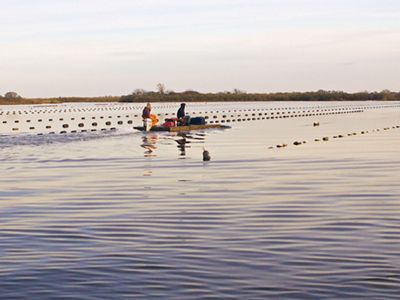
What You Can Do
Climate action starts with you—learn how you can speak up to help protect the future of the shellfish you love to eat, the communities that grow them and the coastlines that sustain them.
-
Senate: A list of phone numbers is available here—all numbers start with (202) 224.
Alternatively, you can find your Senator’s phone number on their website OR you can call (202) 224-3121 and asked to be connected to your senator.
House of Representatives: You can find your representative’s phone number online here OR you can call (202) 224-3121 and asked to be connected to your representative. Not sure who your representative is? Find them using your zip code here.
Once you’re connected, here’s what you can say. (This script is just a starting point; feel free to personalize and include details about your own climate experience.) Don’t be dismayed if they suggest you leave a message—this is very common.
- Hello, I’d like to speak with a legislative aide about climate change.
- My name is ______ and I’m a ________ (shellfish grower, restauranteur, concerned citizen etc) from _________.
- I’m calling to urge [Representative/Senator] _________ to pass legislation that will help decarbonize the economy and adapt to climate pressures—including clean energy tax credits, support for climate-smart food production, investments in nature-based solutions, and funding for coastal resilience.
- Climate change is already an emergency for coastal businesses and communities. Ocean acidification, extreme heat, sea level rise, and more damaging storms are threatening our lives and livelihoods—and any further delay will only worsen the impacts.
- I’m asking [Representative/Senator] ___________ to help protect my business and my community from the worst effects of climate change.
- Thank you for your time and consideration.
-
Hear featured stories from coalition members, friends and supporters—and share your own story about the impacts of climate change on your life. Speak up.
-
Show your support for the coalition by following @shellfish4climate on Instagram. Follow us.
-
Get the latest and greatest coalition updates delivered to your inbox each quarter. Sign up.
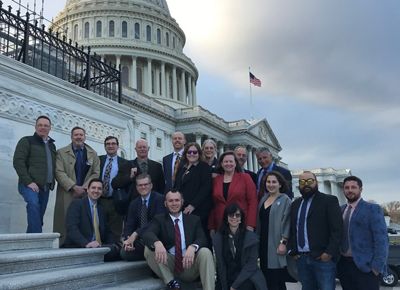
Our Featured Film
Against The Tide: Shellfish Growers Push Back Against Climate Change
Climate change is disrupting the livelihoods of shellfish business owners across the East, the West and the Gulf coasts. While they’ve each experienced this global challenge uniquely, Against the Tide draws out their stories, documenting the shared challenges that bind these small businesses together and chronicling their motivations to take action on climate.
Watch the Trailer
Interested in hosting a screening of Against the Tide in your community?
Contact Sally McGee at smcgee@tnc.org for more information.
Featured Stories
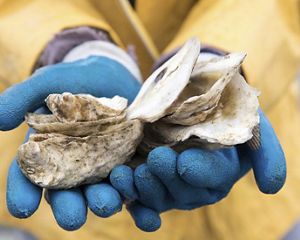
Heard on the Half Shell
Anywhere there’s a coastline, you can find climate impacts—now it’s time to inspire action by letting policymakers know how those impacts have touched the lives of shellfish farmers, coastal residents and the shellfish-loving public.
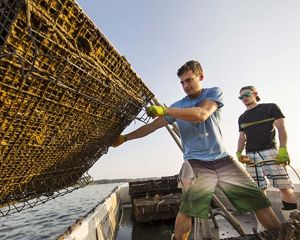
Uniting Shellfish Growers For Climate
Learn about how Shellfish Growers Climate Coalition Project Manager Sally McGee is working with shellfish growers to showcase their perspectives on the impacts of climate change.

Oyster Hatcheries Help the Industry Adapt to Climate Change
How can the shellfish industry adapt to the challenges posed by climate change?
Does your company grow or sell shellfish? Do you manufacture aquaculture gear or other materials that support shellfish aquaculture? Then your company’s participation in the Coalition is vital. Together, we can show that our industry is deeply concerned not just about its prosperity, but its very survival. Join the Shellfish Growers Climate Coalition to be part of the solution.
Connect with Us
Our members are working to secure a low carbon future for the shellfish we all love to eat and the waters that sustain them—before it’s too late.
